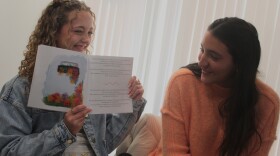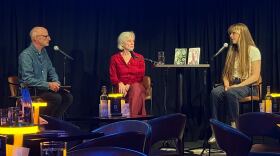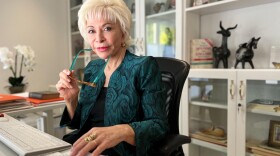The Bookshelf is NHPR's series on authors and books with ties to the Granite State. All Things Considered features authors, covers literary events and publishing trends, and gets recommendations from each guest on what books listeners might want to add to their own bookshelves.
If you have an author or book you think we should profile on The Bookshelf, send us an email. The address is books@nhpr.org.
This week, The Bookshelf features Franconia poet Parker Towle. Towle’s poems take you places. Sometimes it’s on a hike through the woods of Maine. Sometimes it’s back in time, to a fire station where young men shoot pool and watch boxing on black-and-white televisions. Sometimes it’s to a lake where a man admires his wife as she swims.
Wherever they take you, they bring you there with immediacy and poignancy. Parker Towle’s new collection of poems, World Spread Out, transports the reader to all these places and more. Take a listen to Towle's conversation with All Things Considered host Peter Biello, or scroll down to read the Q&A below his book picks..
Parker's Top 5 Book Recommendations:
1. Blue Estuaries by Louise Bogan. “A collected book of poems by a woman whose poetry has obsessed me for the past couple of years. She lived most of her life in New York City and was the critical editor of poetry for The New Yorker magazine.”
2. Otherwise by Jane Kenyon.
3. Kicking the Leaves by Donald Hall.
4. Hannah Coulter by Wendell Berry. “I was not really aware of his fiction, but once I read Hannah Coulter, I read everything. It’s a very warm, emotional, accessible read, with a very, very agrarian, ecological favorite subject matter relating to the family farm and all its ramifications.”
5. The Brothers Karamazov by Fyodor Dostoevsky. “I managed a 96 on the longest and probably the best paper I wrote in college on religion in The Brothers K. And I was docked ten points for turning it in late.”
I was hoping you could start us off with a reading one of your poems.
Surely. The poem is called “Backpacking.”
As it always is after heavy rain
The trail through the Greens was treacherous slime.
He never once asked if I was OK.
We mounted hills, crossed splashing streams,
Maintained through slog the ridge’s spine.
He held a steady pace behind me.
The packs grew heavy as the day wore away,
My legs cramped up on every climb.
He never once asked if I was OK.
Begun at dawn, by dusk my feet
Dragged in tiny steps. Mile
After mile he held the pace behind me.
After sixteen miles of Vermont’s Long Trail,
We might need a head lamp’s light
By the end—did he wonder if I was OK?
By then my broken blisters were bleeding,
The shelter loomed as black as night.
His steady pace held up behind me.
My grandson gave me what I needed that day:
Fortitude, respect, not sympathy.
He never once asked if I was OK,
Just held a steady pace behind me.
A lot of this book seems inspired by, well, partly by family, of course, but also by wilderness. You’re going deep into the woods in New Hampshire’s North Country, northern Maine, Vermont. What inspires you about these locations?
Well, I’ve been climbing mountains since I was four years old. My parents took me up Mount Monadnock and we did it every year thereafter. They were lifetime members of the Appalachain Mountain Club, so we did a lot of camping and canoeing, especially in Northern New England, but occasionally farther afield. So that would be a natural place for me to start to write.
And you still hike?
Oh yes. Yes. We climbed Cube Mountain at the beginning of this week, down in Orford, New Hampshire, and it’s pretty steady year-round.
When you say “we” do you mean you and your wife, Phyllis?
No. That occasion was my daughter, Elizabeth. My wife had hip replacements on both sides, so she is unable to do climbing, but we still walk.
The poems in this book, World Spread Out, the descriptions of nature read like they’re written by someone who spends a lot of time in nature. And they also seem like a vehicle for emotion. Is that how you plan these descriptions of nature?
Yes. I think my key, my marker, that I want to say something is an emotional feeling, often a fairly strong emotional feeling, and often without a description or an obvious stimulus, but then to begin to write about the reality of the incident, these forces come to bear. A good example would be my poem at the end of the book called “Anniversary.” It’s a climb of Mount Mahoosuc Range with my daughter and her dog, but it happened to be the day that my wife and I were married 60 years ago, and we called her on the cell phone from the top of the mountain and I blossomed into emotion. So that became a poem from which the title of my new book is derived.
Can you read “Anniversary” for us?
Surely.
Anniversary
Closer to the summit we got our
second wind. As views enlarged,
haze cleared, especially to the
east where a chilling breeze rose,
exhilarating our skin, wet
and warm from the push upward.
We called you from the top. You were
shopping at the hardware store.
You were cheerful. I started to say
we had had fifty-seven great years
together but it caught in my throat
and all that came out was, “It’s great,”
almost in a shout. You agreed and then
I forced out, “It’s been a great fifty-seven
years!” and passed the cell phone to our
daughter and began to sob in happiness.
She signed off with you and held me
for a long time, the wind howling
around us, alone by the summit cairn.
I told her, “You’re a good girl,” several
times and told Dillon, her dog,
the same thing. We hoisted our packs
and began our descent. I thought for a while
over and over, then spoke out loud,
“Love is a powerful thing”—
I said it twice. We strode
down over an expanse of
low bush and peat moss puddles,
the arms of the world spread out below
and around us far to either side.
I wanted to ask you about Phyllis also because you mentioned in this book that she is one of the readers of your poems. So what’s the feedback process like between you and your wife? Does she make edits that are pretty firm-handed, or—what’s it like?
I’m sure she gives me options, but the great advantage is that she’s very honest and straight-forward and has no hesitation whatsoever in both positive and negative comments and thoughts.
You were a physician. You’re retired now. Was there any part about being a physician that informed your poetry or changed it or influenced it in some way?
I think poetry has informed me a great deal in terms of dealing with people, with patients.
So poetry informed the physician work, and not the other way around?
Exactly—and it provided me with a necessary humility, I think. One might say some sophistication and intuition. I’m not saying I have a lot, but intuition can be important in medicine, though it has to be carefully monitored. But there has been an interrelationship and I think the two pursuits, though very different, have been mutually informative.








